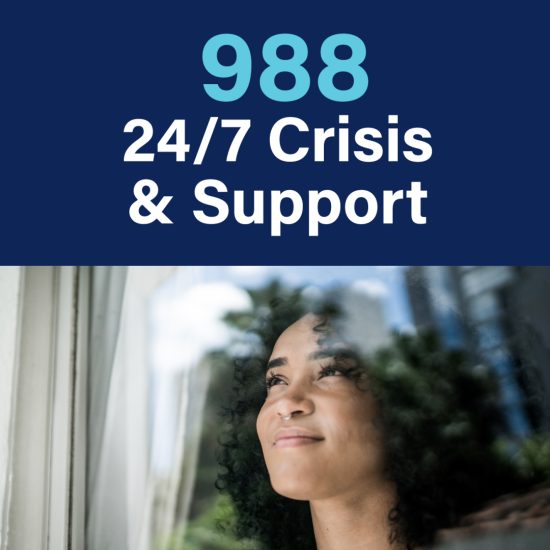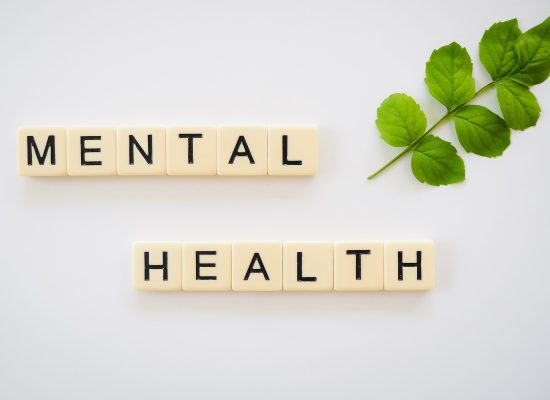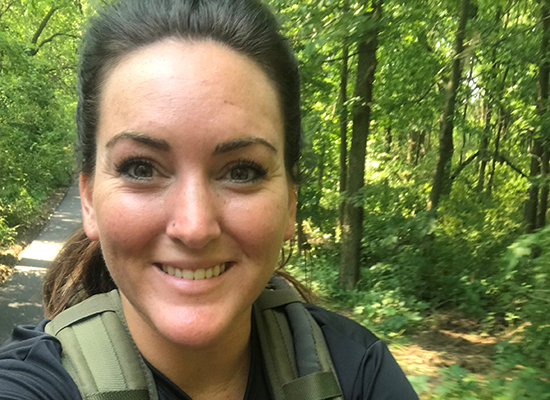New Nationwide Three-Digit Mental Health Crisis Number

Individuals facing mental health crises can call 988 anytime for help and life-saving services
Starting on July 16, a simple three-digit number will connect anyone in the United States to the National Suicide Prevention Lifeline (also called the Lifeline).
The new 988 dialing code will help people facing mental health crises immediately connect to individuals who are specially trained to respond to such situations. It is available for calls (multiple languages) and text or chat (English only).
The Lifeline is free, confidential and available 24 hours a day, seven days a week.
Lifeline crisis counselors understand what callers are going through and know what local resources might make a difference. Anyone who needs support for a suicidal, mental health and/or substance use crisis may dial 988.
The new 988 number aims to strengthen efforts to transform crisis care nationwide. It will serve as a universal entry point so that no matter where someone lives, they can reach a trained crisis counselor who can help.
According to the Centers for Disease Control and Prevention, one in five Americans will have a mental illness in any given year.
The Substance Abuse and Mental Health Services Administration (SAMHSA) reports that in 2020 the United States had one death by suicide about every 11 minutes. Suicide is also a leading cause of death for people ages 10 to 34 years. Additionally, more than 100,000 individuals died from drug overdoses from April 2020 to 2021.
You can learn more about how 988 works and the support it provides on the 988 Frequently Asked Questions page.
This fact sheet also explains the basics about 988. (You can also see the fact sheet in Spanish.)
The current Lifeline phone number of (800) 273-8255 will remain available to people in emotional distress or suicidal crisis, even after 988 is launched.
Individuals may also continue to text the Crisis Text Line (text HOME to 741741). Both offer free, confidential help around the clock, 365 days a year.
You can also visit our online Resource Directory for more mental health services and support.
Resources and Tips to Promote Good Mental Health

Helpful tools and resources for individuals of all ages in honor of Mental Health Awareness Month
May is Mental Health Awareness Month.
Society often focuses on physical health rather than mental health, but both are equally important. Mental health plays a big role in our overall well-being.
Although the pandemic’s challenges have led to more conversations about mental health, talking about it can still feel difficult or out of reach.
It’s important to remember that we all face challenges in life that can affect our mental well-being.
Understanding the topic can help us maintain good mental health and be more informed when experiencing a mental health condition or crisis.
Our Division of Specialized Care for Children (DSCC) team has pulled together a few resources to help get started:
- Life can be challenging, but every day shouldn’t feel hard or out of our control. A mental health screening at mhascreening.org can help provide a quick snapshot of our personal mental health. The screening is free and anonymous. The screening results can help start a conversation with your primary care provider.
- Our DSCC Transition Tools include a Mental Health Resources tip sheet with a helpful list of crisis hotlines, service locators, videos and more.
- Mental Health America’s (MHA) Back to Basics Toolkit, available in English and Spanish, covers a wide variety of topics and tools including stress management, coping skills, recognizing when help is needed and where to find help and support.
- The National Alliance on Mental Illness (NAMI) has resources geared toward kids, teens and young adults. NAMI also provides a coloring and activity book and step-by-step guidance to help parents explore and talk to children about emotional topics or mental health challenges.
- The Illinois Department of Public Health (IDPH) has developed a new “Youth, Adolescent and Young Adult Suicide Prevention” webpage. It aims to help family members and others prevent suicide by knowing the facts about suicide, who is at risk, warning signs specific to this age group and protective factors.
- The Caregiver Action Network provides a Blueprint for Families of Loved Ones with Mental Health Issues.
Remember the National Suicide Prevention Lifeline at (800) 273-8255 and the Crisis Text Line (text HOME to 741741) are available 24 hours a day, seven days a week.
A new, nationwide three-digit number will also be available this summer for people facing mental health crises. Starting on July 16, anyone in the United States can call 988 and get connected to the National Suicide Prevention Lifeline.
More mental health resources are available in our online Resource Directory. You can also follow our DSCC Facebook page for more reminders and tips throughout the rest of the month.
Knowing the basics about mental health will help us all feel better prepared when needed. Support is out there, and recovery is possible.
DSCC Care Coordinator Raising Funds for Soldier Suicide Prevention

Haley Shropshire of the Peoria Regional Office is biking 250 miles as part of nationwide Stop Soldier Suicide Cycling Challenge in July
Four months ago, Haley Shropshire, a Division of Specialized Care for Children (DSCC) Care Coordinator from the Peoria Regional Office, got a new bike. She hadn’t owned a bike since she was 10. Now, she’s part of the Stop Soldier Suicide Nationwide 250 Mile Cycling Challenge during July.
The challenge is raising awareness and funds to end soldier suicide.
“I’ve grown up surrounded by family members and other individuals who have served in the military. My father served seven years in the Army infantry and although he didn’t die of suicide, it’s important that I show my support and respect for what he did to serve our country,” explained Haley. “I don’t usually do Facebook fundraisers, but I love this cause and just had to go for it!”
According to the Stop Soldier Suicide website, veterans are at a 50 percent higher risk of suicide than their peers who have not served. Stop Soldier Suicide’s mission is to reduce the military suicide rate by 40 percent by 2030.
Funds raised through their Facebook challenges provide direct support to service members and veterans at risk for suicide.
Haley cares deeply about this cause and is hoping others will visit her Facebook page for more information, to check on her progress or make a donation by Aug. 7.
“Riding my bike is just so freeing! I’ve really been encouraged by the great comments and support,” Haley said “I set up my page in June and was surprised when I passed my goal before I started riding. I bumped up my goal and am really hoping I can pass it again. It’s all been so amazing!”
Haley is fast approaching her current fundraising goal of $500 and has logged more than 143 miles.
“I’m riding because I want to help and I want service members who are struggling to know there’s help,” Haley said. “I would be thrilled if my challenge could raise $1,000. That would help so many get the help they need.”
Haley also encourages any interested DSCC staff members to ride or join her on Facebook.
“I may be riding my bike alone, but I’m not going solo. It’s been incredible,” she said.
If you know a struggling service member, veteran or military family member, Stop Soldier Suicide can help. If you’re a veteran or service member in crisis, please call (844) 317-1136.


